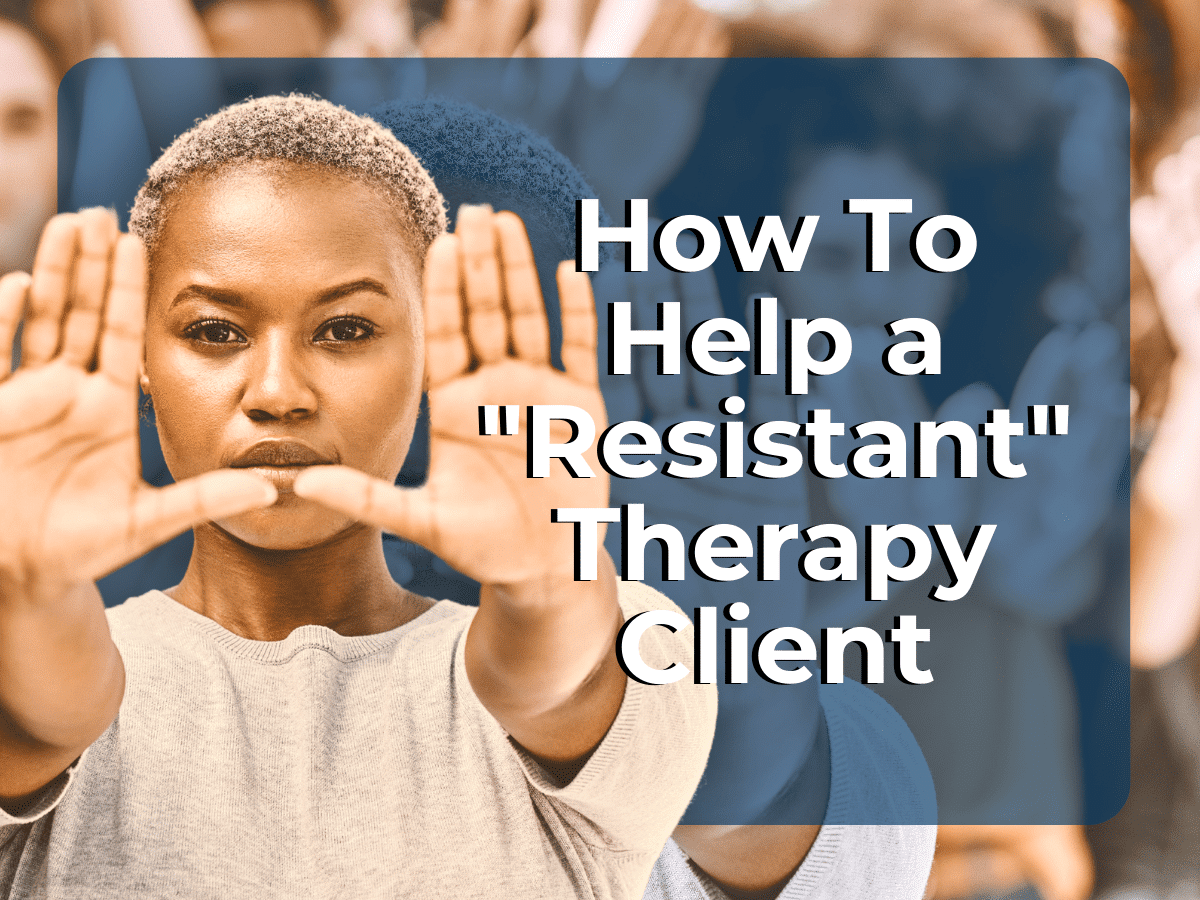As a therapist, you may face challenges and uncertainty when a client seems “resistant” to the therapeutic process you are encouraging. What we are discovering and diving into today is how labeling a client´s behavior as “resistance” or “difficult” can mask a deeper issue, especially when working with clients from marginalized communities.
In the enlightening Therapy Wisdom interview Understanding Resistance as Failed Colonization: Confronting Self in the Therapeutic Alliance with Minoritized Groups, Tracie Rogers and Akilah Riley-Richardson – who leads our free training on liberation psychology – challenge us to question our assumptions and shift our perspective on seemingly difficult client dynamics.
Redefining Therapy Client Resistance
Tracie Rogers suggests that a client’s resistance isn’t something wrong with them, but rather a healthy response to experiences of mistreatment or oppression.
“I see resistance as a sign of survival and mental wellness,” she explains. ” It is pushback from mistreatment… we are talking about people who are historically marginalized…I wanna ask us as practitioners to think about what happens in our minds and our bodies when we interpret something as resistance.”
From Problem to Insight
For historically marginalized groups, this pushback may be a honed survival mechanism, serving them in several ways:
- Protecting Boundaries: People from marginalized groups may have a heightened sense of needing to protect their physical and emotional boundaries due to past experiences of mistreatment. Pushback can be a way to signal those boundaries and prevent further harm.
- Gauging Safety: Pushback can be a way to test the safety of the therapeutic space. By pushing back, a client can assess the therapist’s ability to handle their emotions and experiences – a crucial factor in building trust, especially for those who haven’t felt safe with authority figures in the past.
- Maintaining Autonomy: Marginalized groups may have a history of having their voices silenced or their experiences invalidated. Pushback can be a way to assert their autonomy and reclaim a sense of power within the therapeutic relationship.
- Communicating Needs: Since they may not always have had their needs met, marginalized clients might not be accustomed to directly expressing them. Pushback, though sometimes indirect, can be a way to communicate their needs to the therapist and advocate for themselves.
- Identifying Triggers: The therapist’s response to pushback can be revealing. If a therapist reacts negatively to pushback, it might trigger memories of past negative experiences for the client. This can be valuable information for the therapist to understand and navigate the therapeutic journey moving forward.
Tips for Working with These So-called “Resistant” Clients
Therapist as Learner
In her conversation with Tracie, Akilah introduces the lens and mirror analogy as introduced by Dr. Shawn Ginwright in his book The Four Pivots: Reimagining Justice, Reimagining Ourselves. She explains how while the lens represents our worldview, the mirror forces us to examine ourselves within it. When facing “resistance” from therapy clients, therapists must be willing to consider how their own perspectives and biases might need to shift.
“My mindset is pushed back,” Akilah says, “But maybe…it’s also pushing the therapist forward to do something different, to figure out what am I doing here that’s not working for my client? What useful information is my client giving me about my process?”
Pull Quote – Tracie Rogers
“When working with marginalized populations… I wanna ask us instead of looking out to look within.” – Tracie Rogers
Responding to Resistance with a Decolonized Approach
Acknowledge Power Dynamics:
Recognize the power imbalance within the therapy room, particularly the impact of differences in race, gender, or lived experience.
Examine Your Biases:
Reflect on how your values and assumptions shape your understanding of a client’s behavior. Be open to alternative explanations to client resistance.
Practice Cultural Humility:
Approach clients with curiosity and a willingness to learn from their unique perspective.
Seek Consultation and Training:
Connect with colleagues and engage in further training on decolonization and working effectively with marginalized groups.
Video Transcript: Embracing Pushback in Therapy with Tracie Rogers and Akilah Riley-Richardson
Tracie Rogers: When I talk about resistance, I think about pushback. It’s a healthy response to mistreatment. Even small children, when they don’t like something, can’t always express what’s wrong, but the resistance is visceral, embodied. Part of them knows they’re being mistreated.
I view resistance as a healthy act because it’s pushing back against mistreatment. As practitioners, I believe we should view resistance as a sign of survival and mental wellness, not a maladaptive system like I was taught. We shouldn’t see it as a flaw in the client that needs to be fixed.
When working with historically marginalized people, let’s specifically consider resistance as a response to failed colonization. When we encounter something we label ‘resistance’ during case consultations, what is our interpretation? We’ve been taught to see it as problematic, but with marginalized populations, I urge us to shift our focus from the client and look inward instead.
Akilah Riley-Richardson: I’m thinking about that in the context of a book I’m reading, “The Four Pivots” by Sean Gin (or Jen). He talks about ‘lens’ – how we see the world – but also ‘mirror’, the need to turn our perspective back on ourselves.
Resistance, like you said, is pushback. It made me think that maybe it’s also pushing the therapist forward, prompting us to do something different. How can I use the information my client is giving me – about their experience, about my process – to adjust and improve my practice?
The Power of a Decolonized Perspective In Psychotherapy
A decolonized approach to therapy isn’t just about better serving marginalized or resistant clients in clinical practice; it’s about improving your practice for everyone. By challenging our assumptions, addressing power imbalances, and centering client voices, we become more attuned therapists, capable of building stronger connections and facilitating deeper healing.
Further Resources on Decolonization and Social Justice
Ready to go deeper? These organizations provide excellent tools and training for those interested in dismantling harmful power structures in therapy and beyond:
- The AAKOMA Project: Founded by Akilah Riley-Richardson, The AAKOMA Project (https://aakomaproject.org/) aims to decolonize mental health practices, center the wisdom of marginalized communities, and foster healing and liberation. They offer trainings, workshops, and resources for therapists and community members alike.
- The Nap Ministry: This organization, led by Tricia Hersey, examines rest and liberation as resistance against oppressive systems. Explore their website (https://thenapministry.com/) for insights on the intersection of rest, social justice, and the transformative power of slowing down.
- Liberation Psychology Training with Akilah Riley-Richardson: Discover how systemic trauma disrupts connection and learn to support marginalized clients. In this free, one-hour webinar, you’ll explore Relational Privilege, build Liberatory Connections, and examine your own biases to provide more effective therapy.
- Understanding Resistance as Failed Colonization: Confronting Self in the Therapeutic Alliance with Minoritized Groups with Akilah Riley-Richardson and Tracie Rogers Get the full session and challenge traditional notions of client “resistance” and examine how therapists can unintentionally perpetuate harm. In this powerful interview, Tracie Rogers explores how a decolonial lens and deep self-awareness can transform therapeutic relationships with clients from marginalized groups. Learn actionable ways to build trust, safety, and offer truly supportive care.
Conclusion: Transforming Your View of “Resistant” Clients in Therapy
Decolonization is an ongoing journey of self-reflection, learning, and action. By engaging with these and other resources, you can make your therapy practice more inclusive, empowering, and just for all.



